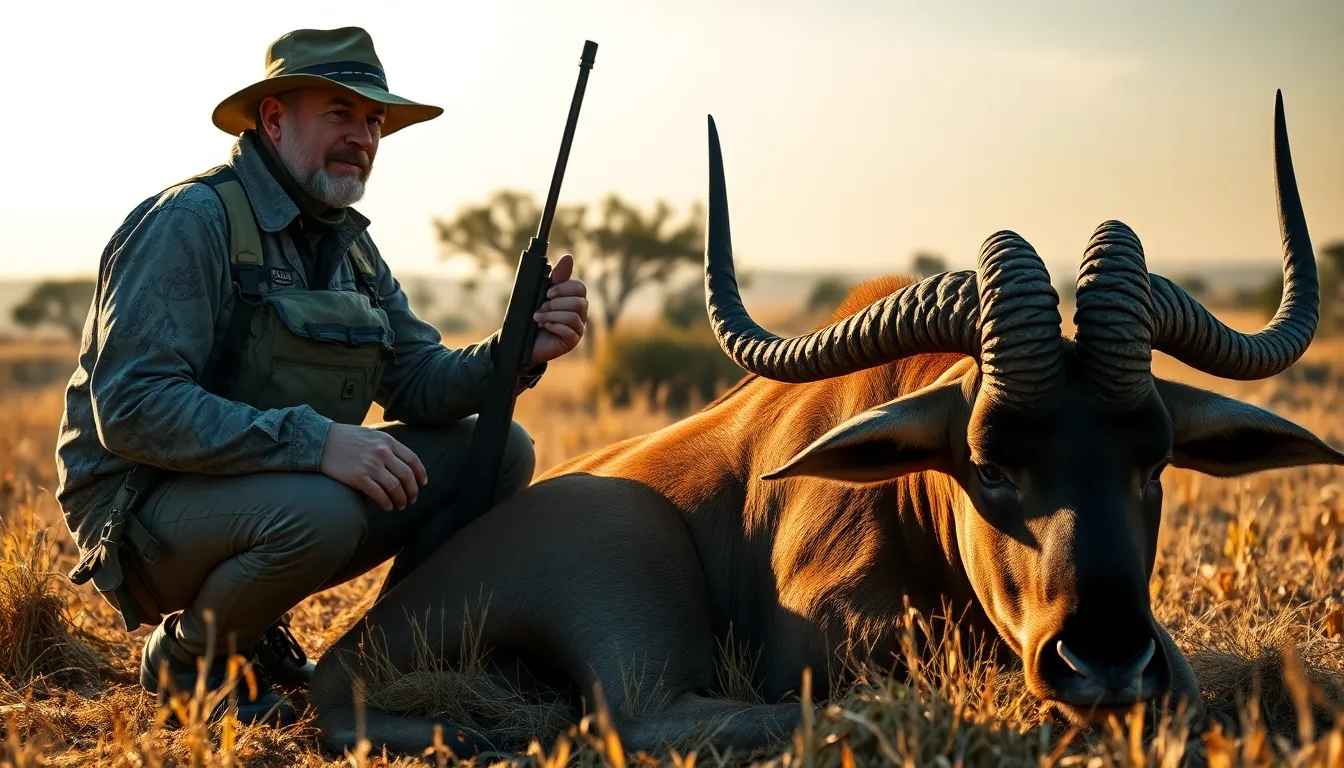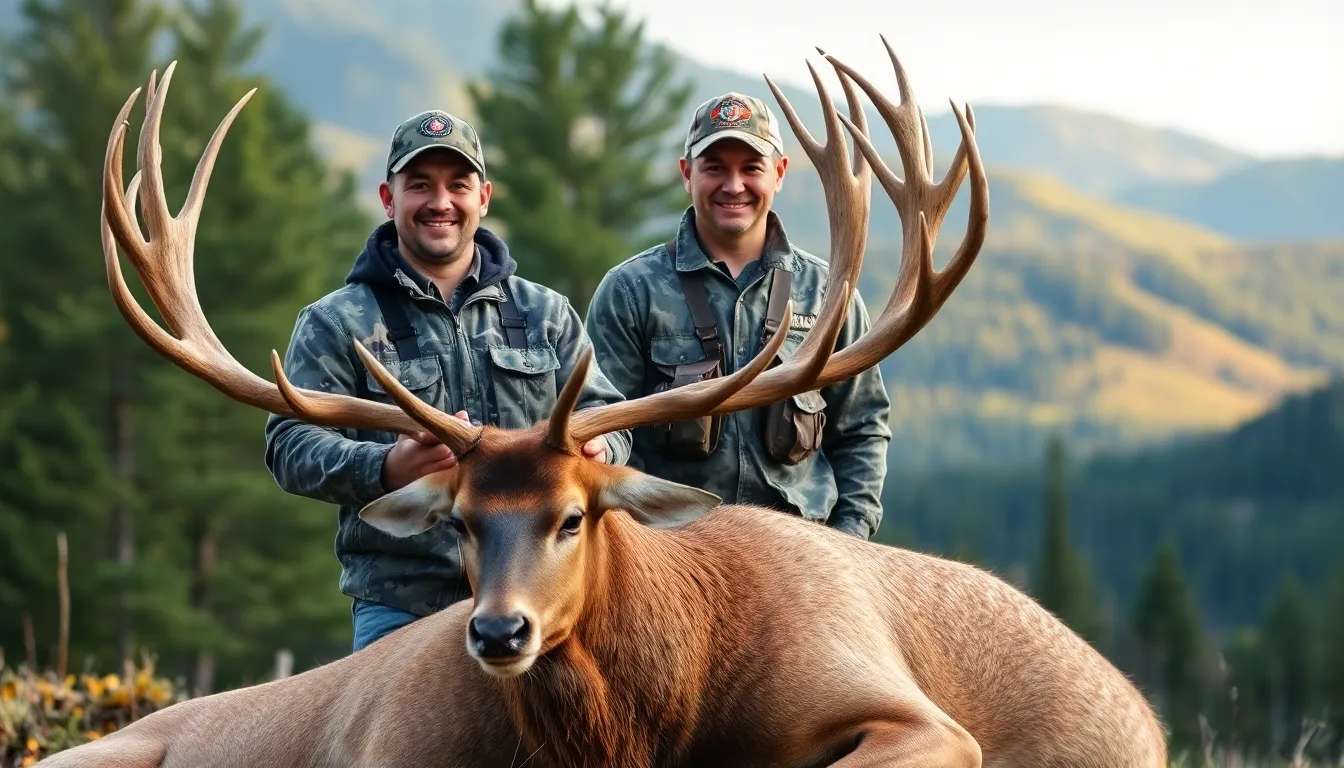Table of Contents
ToggleImagine standing in the wild, heart racing, as you spot a majestic animal in its natural habitat. The thrill of trophy hunting isn’t just about the trophy; it’s about the adventure, the stories, and yes, the bragging rights that come with it. For those who seek a unique blend of adrenaline and appreciation for nature, this experience offers a chance to connect with wildlife in a way few ever do.
But let’s be clear, trophy hunting isn’t for the faint-hearted or those who think they can just pop out for a quick selfie with a lion. It’s a journey that requires skill, respect, and a sense of responsibility. So, whether you’re a seasoned hunter or just curious about the experience, buckle up for an exploration of what trophy hunting really entails—complete with laughs, lessons, and a few surprises along the way.
Understanding Trophy Hunting Experience
Trophy hunting offers an intense blend of skill and adventure. Enthusiasts often seek profound connections with wildlife while engaging in responsible practices.
Definition and Overview
Trophy hunting involves pursuing animals for sport and collecting their parts as trophies. Participants often target specific species, such as big game, to showcase their skills and experience. This practice requires extensive knowledge about animal behavior, environments, and ethical hunting standards. Trophy hunters typically prioritize sustainable hunting practices, ensuring that their activities do not endanger wildlife populations. Many view it as a means of wildlife conservation, supporting habitat protection and ecosystem balance.
Historical Context
Trophy hunting dates back to ancient civilizations that hunted for food and status. Aristocrats and explorers shaped its modern form during the 19th and early 20th centuries. Wealthy individuals sought adventure and personal satisfaction while contributing to conservation efforts. Early hunting expeditions promoted interest in wildlife and spurred legislation to protect endangered species. These histories highlight the intertwining of sport, conservation, and personal achievement in trophy hunting, influencing current perspectives and practices within the activity.
The Process of Trophy Hunting

Trophy hunting involves several key steps to ensure a rewarding experience.
Planning and Preparation
Successful trophy hunting hinges on careful planning and thorough preparation. Hunters research target species and their habitats to enhance understanding. Gaining insights into local regulations and permits is crucial, as laws vary by region. Physical fitness matters; hunters often prepare with conditioning exercises to improve endurance for challenging terrains. Mentorship plays a vital role, as experienced hunters provide guidance, fostering skill development and ethical practices.
Selecting a Location
Choosing the right location significantly impacts the trophy hunting experience. Various ecosystems, including savannas, mountains, and forests, offer unique opportunities. Certain regions may have higher populations of target species, improving chances for a successful hunt. Evaluating local conservation practices and community impacts ensures that hunters contribute positively to wildlife management. Travelers often consider accessibility and accommodation options while selecting prime hunting spots.
Ethical Considerations
Ethical considerations surrounding trophy hunting often spark debate among various communities. This discussion typically centers on conservation benefits and animal welfare implications.
Perspectives on Conservation
Conservationists view trophy hunting as a potential tool for wildlife management. Many hunting programs allocate funds to local communities, fostering economic growth and incentivizing habitat protection. Significant revenue from permits supports conservation initiatives, bolstering biodiversity efforts. Data shows that regulated hunting can lead to stable or growing populations for certain species. Furthermore, successful programs often create protected areas, enhancing wildlife habitats. Advocates argue that when managed correctly, trophy hunting contributes positively to conservation goals, ensuring ecosystems remain intact for future generations.
Animal Welfare Concerns
Animal welfare remains a primary concern in the trophy hunting dialogue. Critics point to the suffering of hunted animals as a moral issue, questioning the justification for the practice. Scientific studies indicate that poorly executed hunts can lead to prolonged suffering for wildlife. Public sentiment often emphasizes the need for humane treatment, aligning with broader animal rights movements. It’s essential to recognize that well-regulated hunting can mitigate these concerns. Responsible practices aim to ensure quick, humane kills while promoting respect for the target species. Comprehensive regulations enhance accountability, balancing hunting interests with ethical standards.
Personal Perspectives on Trophy Hunting Experience
The trophy hunting experience elicits a range of viewpoints from hunters and animal rights advocates alike.
Hunters’ Testimonials
Many hunters express a profound sense of connection to nature during their hunts. This adventure involves patience, skill, and respect for wildlife. For example, one hunter recalls feeling exhilarated while tracking a rare species across diverse landscapes. They describe the thrill of the chase as unmatched, with each encounter reinforcing their appreciation for the environment. Another emphasizes the importance of conservation, stating that contributions from regulated hunting often enable habitat preservation. Their experiences reflect not only personal satisfaction but also a commitment to ethical practices and sustainable wildlife management.
Opposing Views from Animal Rights Advocates
Animal rights advocates firmly oppose trophy hunting, citing ethical concerns and animal welfare issues. They argue that killing animals for sport can cause unnecessary suffering and disrupt ecological balance. Critics highlight the emotional toll on animals and question the justification behind such actions. For instance, numerous reports indicate that trophy kills don’t always lead to strong conservation outcomes. Many advocates stress that alternatives, such as wildlife photography or ecotourism, can provide sustainable income without harming animals. Their perspective emphasizes compassion and the inherent value of all wildlife, advocating for a world where animals are protected, not pursued for sport.
The Impact of Trophy Hunting
Trophy hunting has implications beyond individual experiences, affecting economies and environments alike.
Economic Benefits and Community Support
Economic growth often accompanies trophy hunting initiatives. Local communities benefit from tourism tied to hunting activities. Jobs created in the hospitality sector include lodges, guides, and local craftspeople. Funds generated from hunting permits frequently support community projects, schools, and health care. Moreover, incentive programs can motivate local residents to protect wildlife. Supporting sustainable practices ensures that the financial gains lead to a healthier ecosystem. Community participation in hunting management can foster pride and responsibility toward conservation efforts.
Environmental Implications
Environmental impacts of trophy hunting spark intense discussions. Responsible hunting practices can promote biodiversity and habitat preservation. Well-regulated hunting limits overpopulation, preventing ecological imbalances. In some cases, funds from hunting programs contribute to wildlife conservation initiatives. Those initiatives include anti-poaching efforts and habitat restoration projects. Critics express concerns about potential negative impacts on species diversity and ecosystem health. It’s crucial for hunting strategies to include comprehensive assessments of local populations and environments. Effective management balances hunting interests with ecological well-being, ultimately benefiting both wildlife and communities.
Trophy hunting presents a unique adventure that intertwines skill with a deep respect for wildlife. It offers enthusiasts an opportunity to engage with nature while supporting conservation efforts and local communities. The experience, though controversial, can foster a greater understanding of ethical hunting practices and sustainable wildlife management.
As hunters navigate the complexities of this pursuit, they contribute to broader conversations about conservation and animal welfare. The ongoing debate highlights the need for responsible practices that align with ecological health. Ultimately, trophy hunting remains a multifaceted activity that challenges individuals to reflect on their values and their connection to the natural world.







